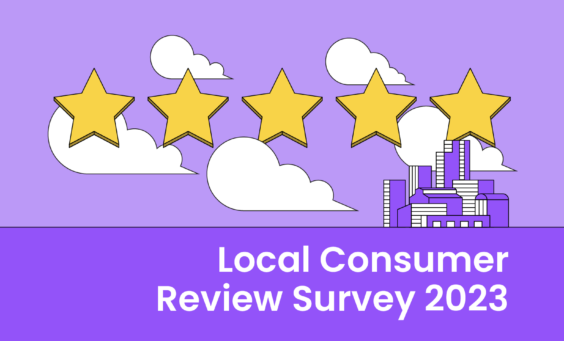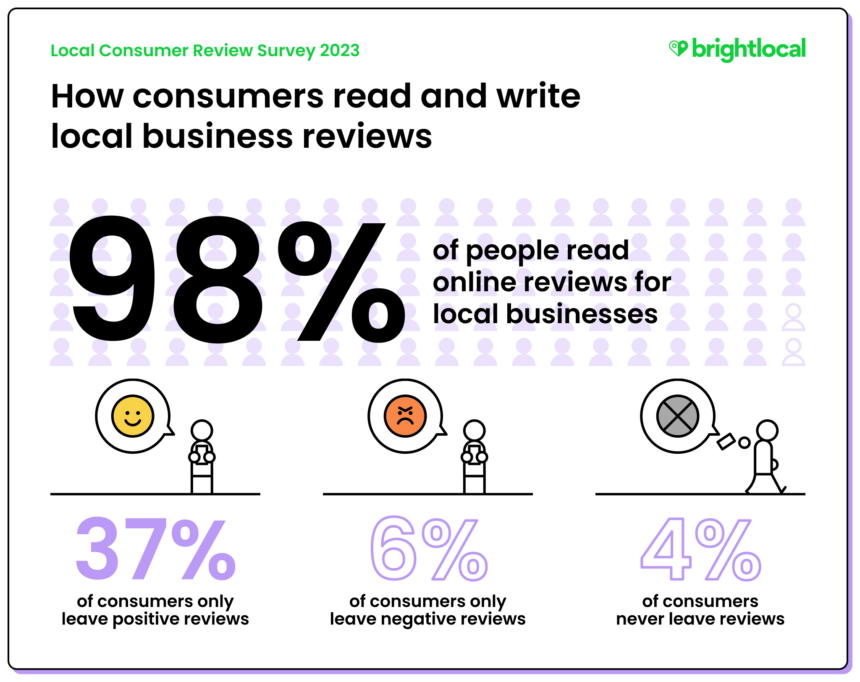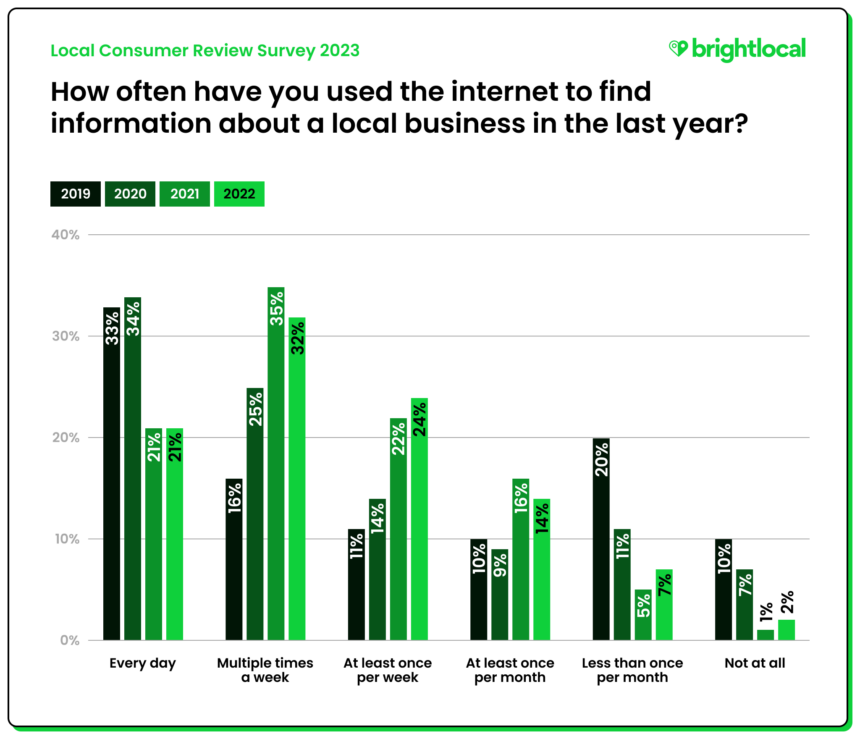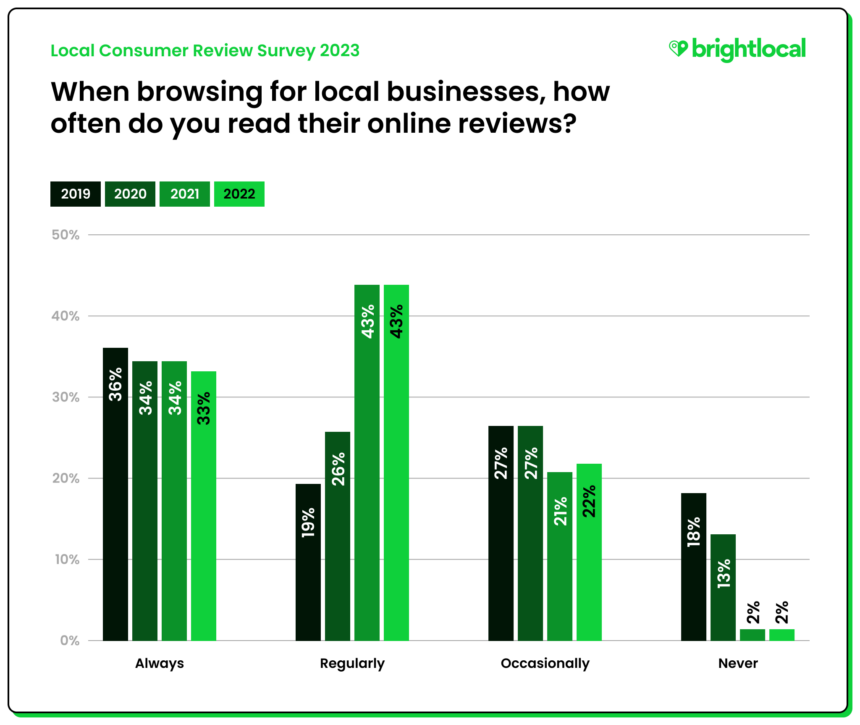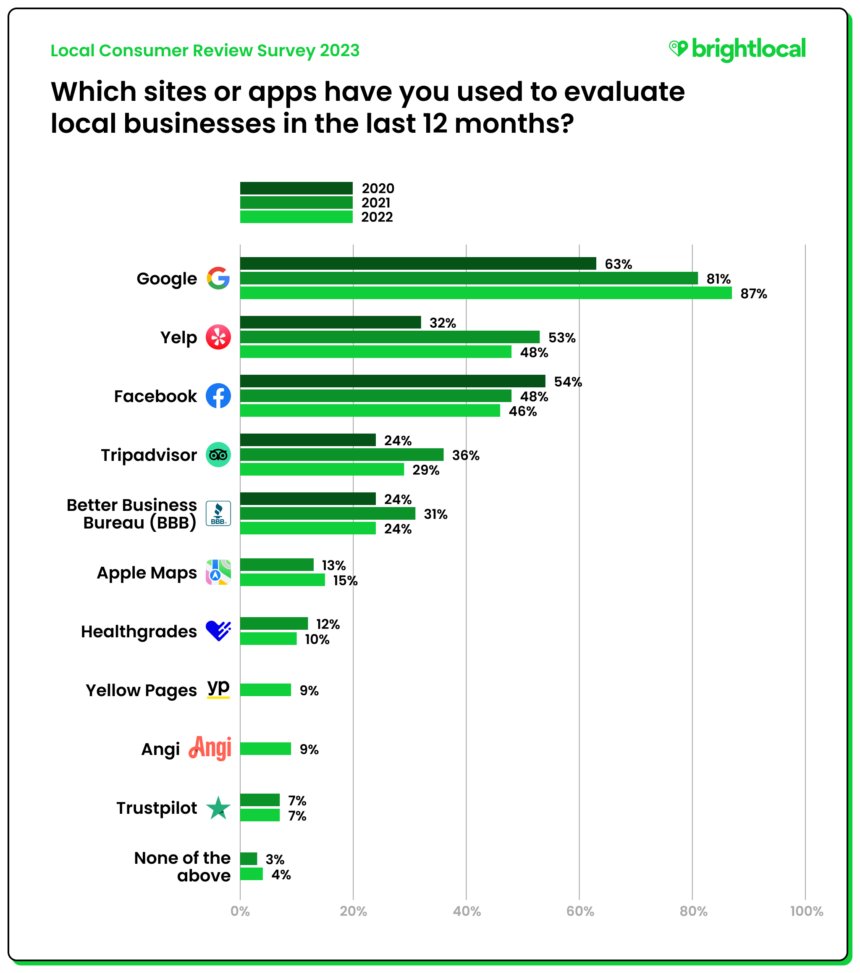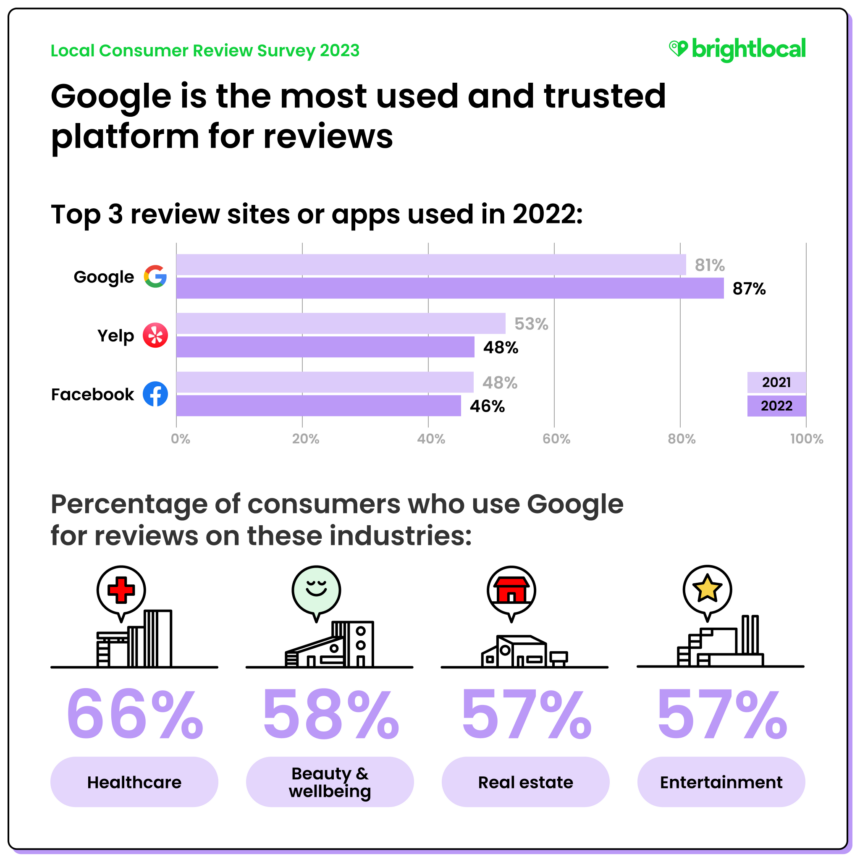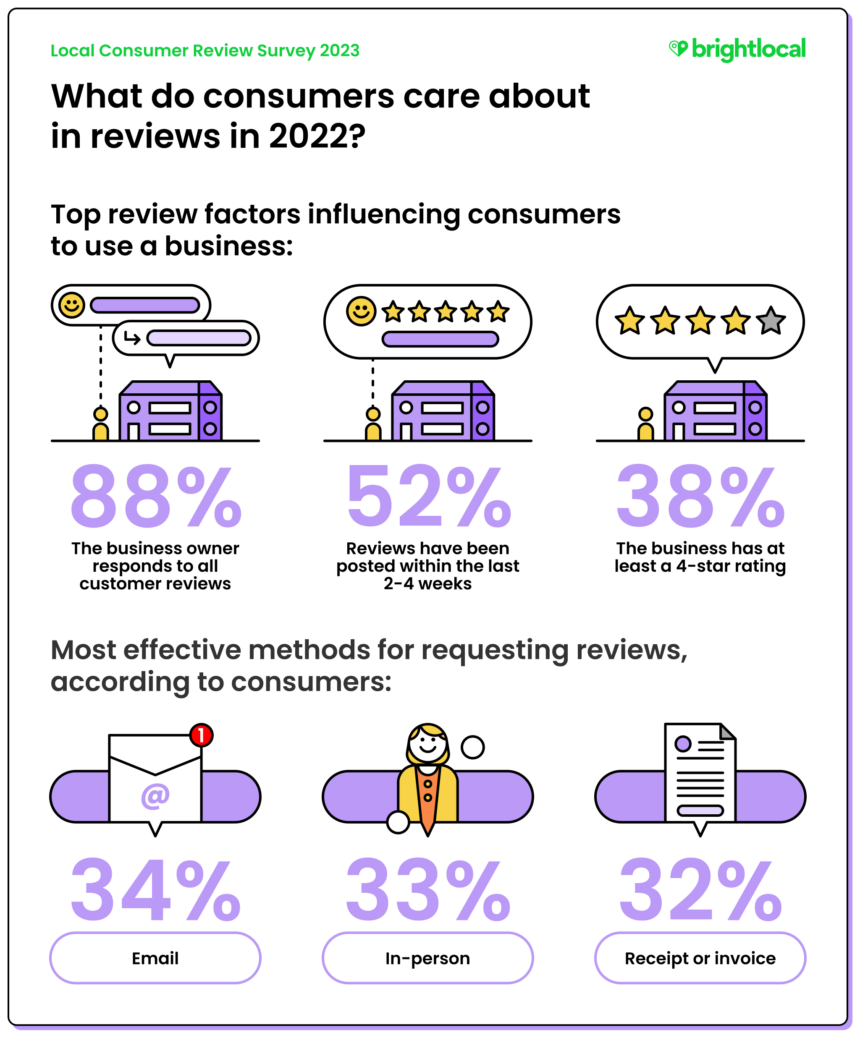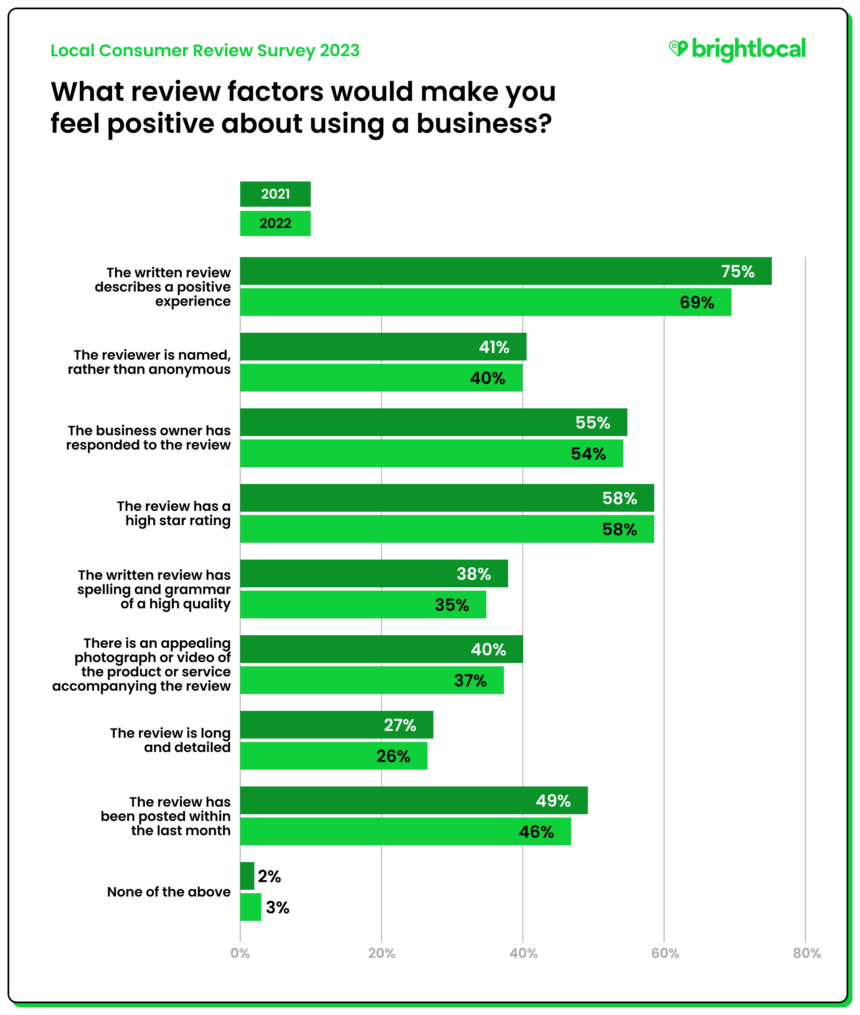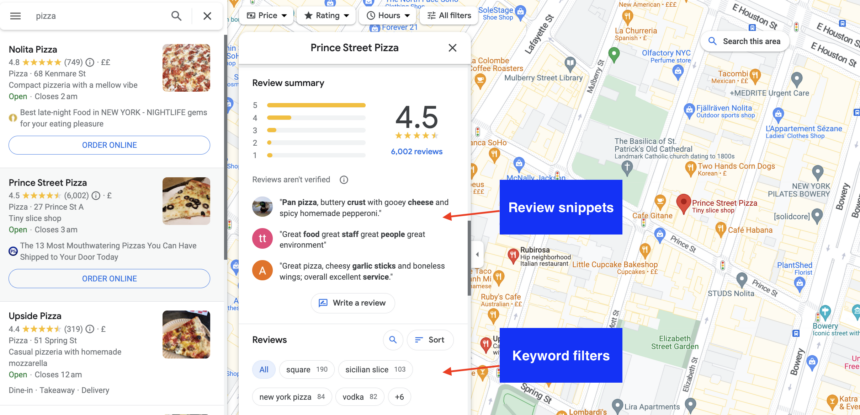BrightLocal: Local Consumer Review Survey 2023
Would you believe that BrightLocal has been exploring the relationship between consumers, online reviews, and local businesses for almost 13 years?
Since 2010, we've seen significant developments in the perceptions of online reviews, the ways businesses engage customers to leave feedback, and the channels or platforms consumers choose to do it on.
Whilst a simple star rating may have been enough to persuade potential customers back then, our findings over the years show that the most important review factors have evolved. This, plus an increasing savviness when it comes to detecting fake reviews, and shifting perceptions of different review platforms, makes for an ever-changing landscape.
We wanted to continue exploring the perennial theme of fake reviews this year, and explore how reviews may be evolving outside of traditional platforms. So, what does the consumer review scene look like in 2023? Let's get straight to it.
Key Findings
- 76% of consumers "regularly" read online reviews when browsing for local businesses, compared to 77% in 2021.
- The number of consumers reading online reviews "every day" fell from 34% in 2021 to 21% in 2022.
- 87% of consumers used Google to evaluate local businesses in 2022, up from 81% in 2021.
- The top industries where consumers see business reviews as most important are: Healthcare, Automotive Services, and Service Businesses/Tradespeople.
- The percentage of consumers using Facebook to evaluate local businesses has fallen for the second year running, from 54% in 2020 to 48% in 2021, and from there to 46% in 2022.
- 42% of consumers are confident they've seen fake reviews on Facebook in 2022, compared to 37% in 2021.
- Google is the most trusted review platform across all industries, although Tripadvisor still has its place for accommodation businesses, Yelp maintains a strong share of trust for food and drinks businesses, and BBB is trusted for businesses in professional trades and real estate industries.
- 26% of consumers were asked to leave a business review in exchange for a discount in 2022, up from 15% in 2021.
- 36% of female consumers are likely to leave a positive review for a business that they know is eco-friendly, compared to 24% of male consumers.
- Outside of standard review platforms, 35% of consumers use YouTube to find information about local businesses, 32% use Instagram, 20% use TikTok, and 35% of consumers consult their local news.
We've been asking consumers a number of the same questions year on year, helping us to determine trends in user behavior and benchmark the results. To begin with this year, we asked about the frequency with which consumers are searching for and reading business reviews online.
How often are consumers researching businesses online?
- 98% of consumers used the internet to find information about local businesses in 2022, up from 90% in 2019.
- The percentage of consumers using the internet to find information about a local business every day has remained stable, at 21%.
In 2020, 34% of consumers used the internet to gather information about local businesses every day. This figure dropped to 21% in 2021, and the percentage of people finding information about local businesses online remains static in 2022.
Despite this, last year's Local Consumer Review Survey revealed that the general frequency in which consumers used the internet to find information about local businesses had increased. It appears the frequency of people looking for business information online decreased slightly in 2022, as 7% of consumers stated that frequency as less than once per month, compared to 5% in 2021. 2% of consumers said they have not used the internet to research local businesses at all in the last 12 months.
It's important to note that, on the whole, these changes are slight, so the general pattern remains fairly stable. However, the minor change in frequency could be an indicator of the current economic climate and how the typical US consumer's needs have shifted as a result.
According to Medallia, 44% of US consumers described their financial status as "worse off" in 2022 than in 2021—so, with less disposable income to spend on goods and services, there is arguably a lesser need to search for local businesses as frequently.
How often do consumers read online business reviews?As for the consumers "regularly" reading business reviews, this figure has also remained static, holding at 41%, since 2021.
- 98% of consumers at least "occasionally" read online reviews when researching local businesses.
- 76% of people "always" or "regularly" read online reviews for local businesses.
The fact that 2022's results are pretty similar to 2021's suggests that consumer reliance on using the internet to read online business reviews has remained about the same, which doesn't come as much of a surprise.
If anything, this consistency in how often people are reading reviews is good news for local businesses—those that are investing time and effort in growing their review profiles, anyway.
For the last couple of years, we've been analyzing which review platforms consumers navigate to as part of their local business research.
- In 2022, 87% of people used Google to research local businesses (up from 81% in 2021).
- Consumer use of Yelp to evaluate local businesses has decreased from 53% in 2021 to 48% in 2022.
- The percentage of consumers using Facebook for business reviews has decreased for the second year running, sitting at 46% in 2022.
The biggest story around review sites in 2022? It's clear that more people are using Google to research local businesses. This rose from 63% in 2020 to 81% in 2021, and now up to 87% in 2022.
According to ReviewTracker, Google holds the largest number of reviews—at a whopping 73% of all online reviews. And, while it follows that more people would be using a site with the most reviews to search for local business information, Google also regularly tests and introduces updates to the reviews platform to improve the experience for users.
If Google can shorten the journey between search and results as much as possible, why would a user need to navigate to another review site? This impressive gain certainly goes to show that local businesses cannot afford to ignore the opportunity to claim—and maintain—their Google Business Profiles.
More people using Google to research businesses has natural implications for other leading platforms like Yelp and Facebook. Following a significant rise in 2021, the percentage of people using Yelp to research local businesses dropped from 53% to 48%.
What matters to consumers about online reviews?
So far, we've examined where and how often people are reading reviews, and in what circumstances they're writing their own—but what elements of review content can convince someone to use a local business?
We wanted to find out how important reviews are for businesses across different industries, as well as whether star ratings are still seen as important as other factors.
What review factors influence consumer decisions when choosing a local business?
When it comes to reviews, consumers need to be reassured by what they see. But that might look different for different people. Does seeing an average rating cut it for making a decision, or do they need to read into the details?
- 69% of consumers would feel positive about using a business with reviews describing a positive experience.
- A high star rating would make 58% of people feel positive about choosing a local business.
- 54% of consumers would feel positive about using a business when the owner responds to reviews.
The pattern of responses in 2022 (shown above) remains consistent with those of 2021, albeit with slight drops in percentage points across the options.
Although it might seem obvious that most consumers see reviews describing a good experience as a positive indicator, it emphasizes the point that consumers are paying attention to the written content of the review itself.
However, 74% of people did not indicate a lengthy or detailed review as important in their decision-making. Why is this interesting? Well, once upon a time, lengthy essay-like reviews were often written and read on the likes of Tripadvisor, but we can see that the way consumers engage with review content in 2023 has shifted.
Although, as marketers, we can't control the content of consumer reviews (and absolutely should not try to, but more on that later!), it does highlight the importance of aspects like keywords that many review platforms utilize to assist consumers.
For example, Google enables filters based on keywords in reviews, and displays snippets of key information, allowing people to quickly find the reviews that are most relevant to their needs.
Source: Bright Local
Local Consumer Review Survey 2023: Customer Reviews and Behavior

Small Business Websites and Marketing Statistics 2023 by BusinessDIT - Blog

Does Google Ads Work For Small Businesses? by Eternity - Blog

8 reasons why your business needs a website - Blog

Business page on Social Networks or website - Blog
When you subscribe to the blog, we will send you an e-mail when there are new updates on the site so you wouldn't miss them.

